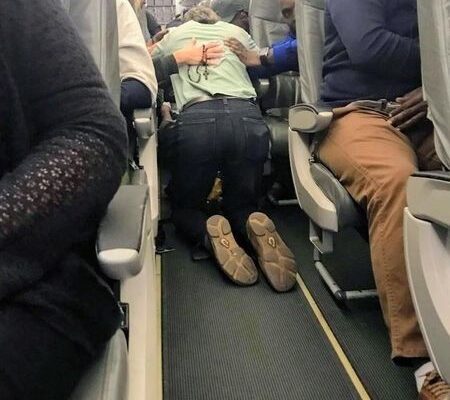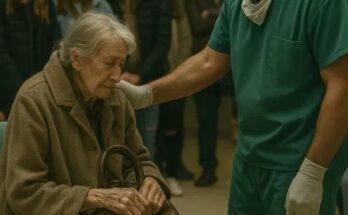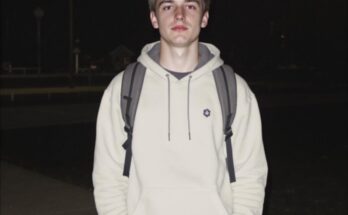MID-AIR PANIC: THE MAN IN 12C WASN’T BREATHING—AND ALL EYES TURNED TO ME
I wasn’t supposed to be on that flight.
My original connection got canceled last minute, and they rerouted me through Denver on a red-eye to New York. I was exhausted, wearing sweatpants and leftover mascara, just hoping for silence and sleep in seat 14A.
But then the overhead call shattered everything: “If there’s a doctor on board, please press your call button immediately.”
The plane went dead quiet. Every head turned like we were in some bizarre theater. I hesitated—just for a second. I’m not a doctor. I’m a trauma nurse. There is a difference, but adrenaline doesn’t care about job titles.
So I stood up.
The flight attendant practically dragged me to row 12, where a man was slumped sideways, his lips tinged blue. A woman—I think his wife—was crying and mumbling something about “heart… he said it felt tight… he said he was fine…”
I went straight into muscle memory: pulse check, airway, chest compressions. The aisles were too narrow. My knees bruised against the seat. People were watching, whispering, gasping, recording—I felt it. But my focus was on the shallow thud of his sternum under my palms.
And then, out of nowhere, a voice behind me said, “Let me help. I’m a paramedic.”
We locked eyes. I didn’t recognize him, but something about his calm cut through the noise in my head. For the next twenty minutes, we worked like we’d trained together for years. The pilot dropped the altitude. Someone brought a defibrillator. His pulse came back—barely.
I remember gripping the man’s cold wrist and whispering, “Don’t leave. Not here.”
We still had 42 minutes until we landed in Chicago for an emergency diversion. But halfway through, the man’s pulse flickered again—then flatlined.
I turned to the paramedic and said—
“Switch. I’ll prep the shock.”
He nodded, slid right into compressions. I snapped the pads onto the man’s chest, shouted “CLEAR,” and hit the button. His body jerked. Still no rhythm.
We tried again.
“CLEAR!”
Another jolt. Another empty beat on the monitor.
His wife was sobbing now, her hand clutching her chest like she was feeling the pain secondhand. The flight attendant knelt beside her, whispering softly, trying to calm her down.
“I’m not letting go,” I muttered, more to myself than anyone. One more shock. One more round of compressions.
And then—
A blip.
Another.
Then a slow, steady rise on the monitor.
He had a pulse.
The entire cabin seemed to exhale at once. I didn’t realize how quiet it had gotten until that moment. I looked up, and people were crying. Clapping. Someone in the back shouted, “You’re a damn hero!”
I shook my head. I didn’t feel like one. I felt like I had just held someone’s life between my hands, and somehow—by grit or grace—I hadn’t dropped it.
When we landed in Chicago, EMTs rushed on board. The paramedic and I gave a quick rundown as they lifted the man onto a stretcher. He was still unconscious, but stable. His wife grabbed my hand with both of hers and just kept saying “thank you” over and over again, like a prayer.
And then, just like that, they were gone.
I sat back down in 14A, hands still trembling, shirt damp with sweat. The paramedic walked past me on his way back to his seat.
“I’m Mateo,” he said.
“Calla,” I replied.
“Nice work in there, Calla.”
I smiled weakly. “You too. Maybe we’ll meet again under… calmer circumstances.”
He laughed, nodded, and disappeared toward the rear of the plane.
I didn’t sleep the rest of the flight. My brain kept replaying it—every second of it. I kept wondering what would’ve happened if I hadn’t stood up. If I’d said, “I’m just a nurse.”
But here’s what I’ve learned: “Just” can save a life.
It’s easy to doubt yourself, to wait for someone more qualified, louder, more confident. But sometimes, you’re the one. And when the moment calls you—stand up.
You never know who might live because you didn’t sit back down.
If this story moved you, share it. Maybe someone out there needs the reminder: you are more capable than you think. 💛✈️
👇
Like & share if you believe in everyday heroes.



